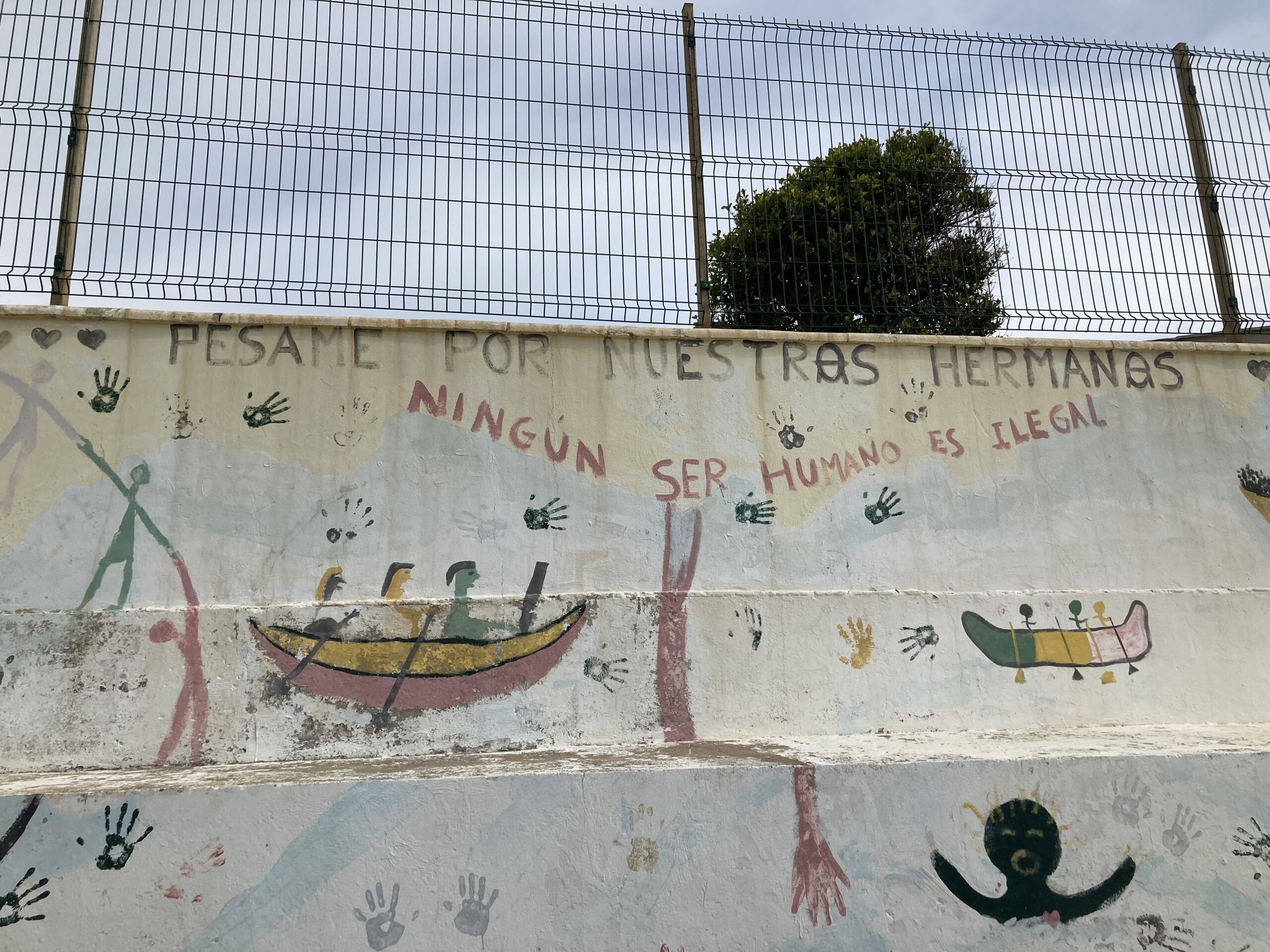
Migrant solidarity street art in a Spanish coastal town. Photo by Wendy Vogt
The world seems gripped by migration panic. In political discourse and media coverage, it appears as if the whole world is knocking on the doors of Europe and the United States. As we write, the US government has brought in the National Guard and the Marines to violently crack down on civilians protesting the mass deportation of immigrants in Los Angeles. We have witnessed the unlawful detention and attempted deportation of migrants to “terrorist” prisons in El Salvador, South Sudan and Libya and the disappearance of international students from city streets. These state tactics rely on a conception of borders as always-already there, and yet they also reveal how the “border” and bordering practices occur far away from territorially fixed spaces. Borders of the contemporary world are increasingly malleable and manipulated to serve political interests. For example, when migrants are sent to places where they have no familial belonging, it reveals the state’s racialized blurring of “immigrants” into a uniform Other who can be easily displaced from one Global South locale to another in the name of “security.”
All eyes are on the US at the moment, and despite the spectacularity and brazen cruelty of Trumpism, the current US war on migration and migrants is not new or unique. Rather, it dramatizes a historically produced practice of powerful states externalizing and racializing borders to contain whole populations for the purpose of extracting value from both their mobility and their immobility. The racialization and criminalization of mobility are key mechanisms of consolidating economic and political power in the contemporary world.
Yet, as scholars working in Africa, Latin America and the Mediterranean, we are concerned with how the overrepresentation of migration to the Global North obfuscates the political economic and transregional dynamics of mobility, including the many ways that people move (and have always moved) within regions of the Global South. In this issue, we examine how communities around the world are affected by the criminalization of their mobility and how they respond to it.
These papers bring together anthropologists and critical geographers whose research examines the everyday ways border externalization plays out in contexts often located far from borders themselves. This collection connects the conceptual and socioeconomic threads of transregional cross-border mobility, examining, among other issues, how heightened state securitization has militarized movement, making it both more costly and more dangerous to move anywhere. By foregrounding the dynamics of south-south migration within sending- and transit countries, this cluster of essays critically highlights the dialectics and power dynamics between north-south securitization and externalization projects, and also the ways they are co-constituted, reshaped and contested within local spaces. Transit states are not simply pawns in a larger geopolitical game of chess, but composed of multiple actors, institutions and interests that profit from mobility.
How has migration become an economy in which people are differently valued (and de-valued), in which mobility itself becomes a site of value extraction? Who benefits from these processes of value-making? Collectively, the papers foreground ethnographic scholarship on interregional mobility in the Global South that reveals how people live across and through borders, and how they navigate the violence of bordering through everyday transactions and crossings. Militarized bordering affects those migrating for work or escaping violence, and those who facilitate their movement. This same militarization also affects a host of other people who may not be categorized as migrants, but whose livelihoods depend on crossing, including pastoralists, local traders, truck drivers, and clandestine gold miners. How are their movements impacted by gendered and racializing technologies of bordering? And how do those who do not move, but dwell in local spaces of transit and arrival, engage emerging economies of mobility? In addressing these questions, we challenge liberal ideologies of state sovereignty, security and humanitarian reason to examine instead the ways state economies assert the power to determine what is legal and illegal, while benefiting from economies of illegality.
Ethnography offers a lens to understand how the war on migration operates across scales of geopolitical struggle and everyday life. This collection counters superficial representations of migration that divide the world into regional silos and migrants into binary categories of either victim or criminal. Through interdisciplinary research that foregrounds comparative ethnographic perspectives in and from the Global South, we highlight how state bordering and violence impact lives and livelihoods across the world. In addition to moving the empirical eye beyond the Global North, authors in this special issue work to de-center national borders as privileged sites of inquiry, and instead consider the multiple frontiers where bordermaking practices take place between and within states. In doing so, our contributing authors challenge traditional understandings of mobility or “people on the move.” We instead consider the complex infrastructures, systems and economies that often render migrants “stuck in place” as well as the worlds of non-migrant locals whose lives are deeply entangled with processes of mobility.
Acknowledgements
The New School’s Zolberg Institute on Migration and Mobility provided funding for the workshop that led to this special issue.
Anna Simone Reumert is a Junior Research Fellow at Brandeis University’s Crown Center for Middle East Studies. She holds a PhD in Sociocultural Anthropology from Columbia University, and has previously been a Zolberg Migration Studies fellow at the New School for Social Research. Her forthcoming book Mobilized: Labor and Political Mobilization Out of Sudan, follows Sudanese migrant workers in Lebanon and back to Sudan in the midst of revolution and war.
Wendy Vogt is Associate Professor of Anthropology at Indiana University, Indianapolis. Her book, Lives in Transit: Violence and Intimacy on the Migrant Journey, published in the California Series in Public Anthropology, chronicles the dangerous trajectories of Central American migrants crossing Mexico and is based on long-term ethnographic fieldwork in humanitarian aid shelters and other transit sites.
Charlie Piot is Professor of Cultural Anthropology and African & African American Studies at Duke University. His recent book, The Fixer: Visa Lottery Chronicles, documents the travails of West Africans selected in the US Diversity Visa Lottery as they navigate the immigration system and life in the US.
Cite as: Reumert, Anna Simone, Wendy Vogt and Charlie Piot. 2025. “Introduction: Bordering and the War on Migration”. In “Introduction: Bordering and the War on Migration”, edited by Anna Simone Reumert, Wendy Vogt, and Charlie Piot, American Ethnologist website, 23 September 2025. [https://americanethnologist.org/online-content/introduction-bordering-and-the-war-on-migration-by-anna-simone-reumert-wendy-vogt-and-charlie-piot/]
This piece was edited by American Ethnological Society Digital Content Editor Kathryn E. Goldfarb (kathryn.goldfarb@colorado.edu).




